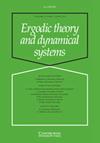A mechanism for ejecting a horseshoe from a partially hyperbolic chain recurrence class
IF 0.8
3区 数学
Q2 MATHEMATICS
引用次数: 1
Abstract
Abstract We give a $C^1$ -perturbation technique for ejecting an a priori given finite set of periodic points preserving a given finite set of homo/heteroclinic intersections from a chain recurrence class of a periodic point. The technique is first stated under a simpler setting called a Markov iterated function system, a two-dimensional iterated function system in which the compositions are chosen in a Markovian way. Then we apply the result to the setting of three-dimensional partially hyperbolic diffeomorphisms.从部分双曲链递推类中弹出马蹄形的机制
摘要给出了一种$C^1$摄动技术,用于从周期点的链式递推类中导出一个先验的给定有限周期点集,并保留了一个给定有限的同/异斜交点集。该技术首先在一种称为马尔可夫迭代函数系统的简单设置下陈述,这是一种二维迭代函数系统,其中以马尔可夫方式选择组合。然后将结果应用于三维部分双曲微分同态的设置。
本文章由计算机程序翻译,如有差异,请以英文原文为准。
求助全文
约1分钟内获得全文
求助全文
来源期刊
CiteScore
1.70
自引率
11.10%
发文量
113
审稿时长
6-12 weeks
期刊介绍:
Ergodic Theory and Dynamical Systems focuses on a rich variety of research areas which, although diverse, employ as common themes global dynamical methods. The journal provides a focus for this important and flourishing area of mathematics and brings together many major contributions in the field. The journal acts as a forum for central problems of dynamical systems and of interactions of dynamical systems with areas such as differential geometry, number theory, operator algebras, celestial and statistical mechanics, and biology.

 求助内容:
求助内容: 应助结果提醒方式:
应助结果提醒方式:


